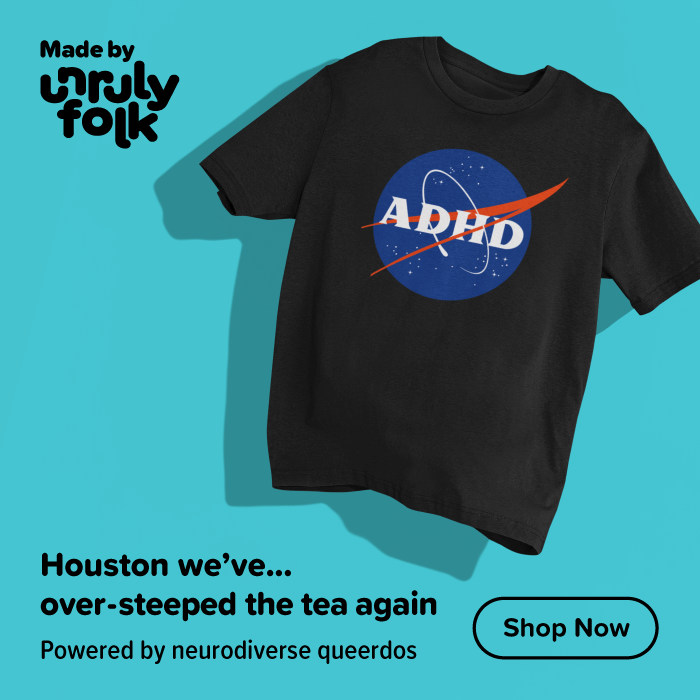Ever had one of those moments where you’re deep into a bag of chips, and suddenly you realise you’re not just snacking—you’re on a mission with no end? Yeah, me too. It’s like I’m in a battle, but the opponent is my own brain. If you’re ADHD like me, maybe you’ve been there too, caught in the crossfire of a binge eating session, where self-control feels impossible.
I’m an AuDHDer—yes, that delightful mishmash of autism and ADHD—and I’ve spent a good chunk of my life figuring out where one ends and the other begins. Spoiler: it’s a mess. But one thing’s clear: the connection between ADHD and disordered eating is real, and it’s complicated as hell.
You see, for many of us with ADHD, there’s this constant need for dopamine—our brains are basically dopamine junkies because we don’t produce enough. We binge on everything we enjoy: TV shows, games, impulse buying—name it, and we’re probably overindulging. And food? Well, food is just another one of those dopamine and sensory-seeking avenues. It’s like your brain’s way of saying, “Hey, I need some feel-good chemicals, stat!” But of course, it’s a temporary fix that comes with a heavy dose of guilt and shame afterwards. That’s where my ADHD meds come in. A lot has changed for me since resuming methylphenidate, not just in managing my ADHD symptoms but also in reining in my binge eating. Without it, I never feel full. Like, ever. My “off button” is permanently out of order.
Before medication, I’d eat until I felt sick. It was the only way I could feel anything close to satisfied. But with a combination of meds and trying (emphasis on trying) to stick to one large meal a day, things got better for a while. Not perfect, but better. However, the past couple of years have been increasingly challenging as I now cook for my family and want to set a good example for my child. Family time around the dinner table is important, but it makes it all the more difficult to manage my eating habits.
And then there’s the water thing—hydration is a whole other story. My meds make me even more dehydrated, and let’s just say I’m not exactly great at remembering to drink enough water. Interoception (basically, being aware of your own body’s signals) is tricky for me. I don’t really feel “full” unless I’m completely stuffed, but sometimes I forget to eat all day. It’s like my body’s signals are all on mute, and I’m constantly trying to decipher what’s actually going on.
So, where does that leave me? Well, still fighting the good fight. I’m at a “healthy weight”, but it has been creeping up lately, and I feel the pull to the dark side daily. It’s a constant battle, and while medication has been a huge benefit, it’s not a magic bullet. For me, they only help control my eating; they don’t eliminate the struggle, and when they wear off at the end of the day, that ravenous feeling comes rushing back.
Binge eating is complicated. It’s not just about willpower or self-control; it’s about a brain that’s wired differently. It’s about trauma, dopamine-seeking, and the blurry line between ADHD and everything else.
I’m sharing my story here not to tell you what to do or to promise some miraculous cure—if only life were that simple! I’m just a peer, hoping my experience might resonate and offer a bit of solace or insight. But hey, if you’re looking for a few tips that might help manage binge eating while navigating ADHD, consider these:
1. Mindful Eating: It’s not easy, but taking a moment to really enjoy your food can help. Pay attention to flavours, textures, and sensations. It can make a difference.
2. Regular Meals: Try to keep a consistent meal schedule. It helps to avoid those wild hunger swings that can lead to bingeing. I know cooking for a family complicates things, but maybe it’s possible to find a balance that could ease the struggle.
3. Hydrate: Staying hydrated is key. It sounds basic, but sometimes, it’s the little things that help keep those cravings in check. I know my medication can leave me feeling like a dried-out Spongebob, so drinking water becomes even more crucial.
4. Self-Awareness: Recognise your triggers and find alternative ways to manage them. It could be a new hobby, a workout routine, or just some downtime. The idea is to channel that dopamine-seeking into something that doesn’t involve food.
5. Seek Support: Whether it’s talking to a therapist, joining a support group, or just confiding in a friend, having someone to share your journey with can be incredibly valuable.
Remember, these are just some suggestions based on my experience. Everyone’s journey is unique, so take what works for you and leave the rest. We’re all in this together, and sometimes, just knowing you’re not alone can make a world of difference.
And hey, if you ever need someone to talk to while you’re navigating this chaotic journey, you know where to find me. Let’s keep the conversation going—because we all deserve to be heard.




























































